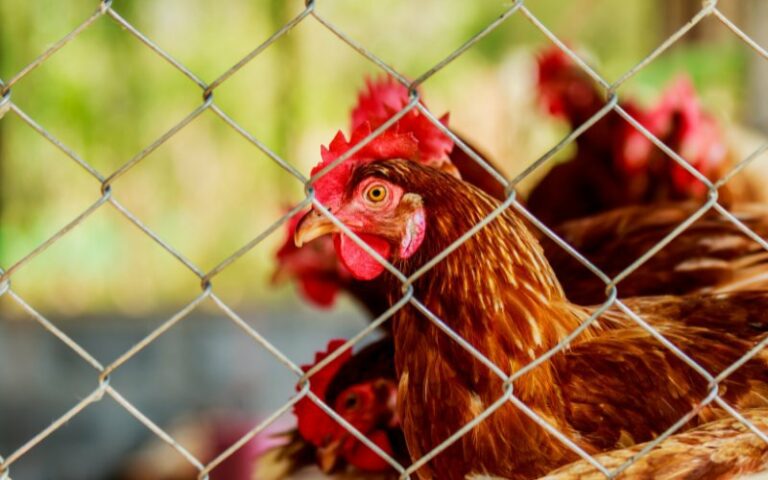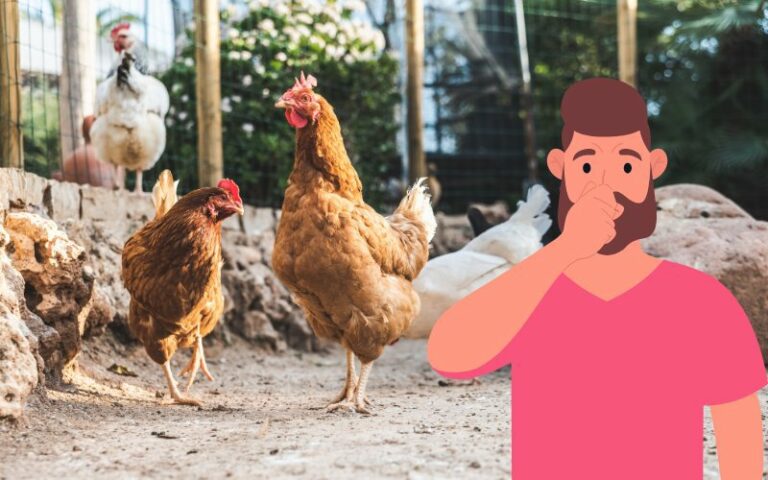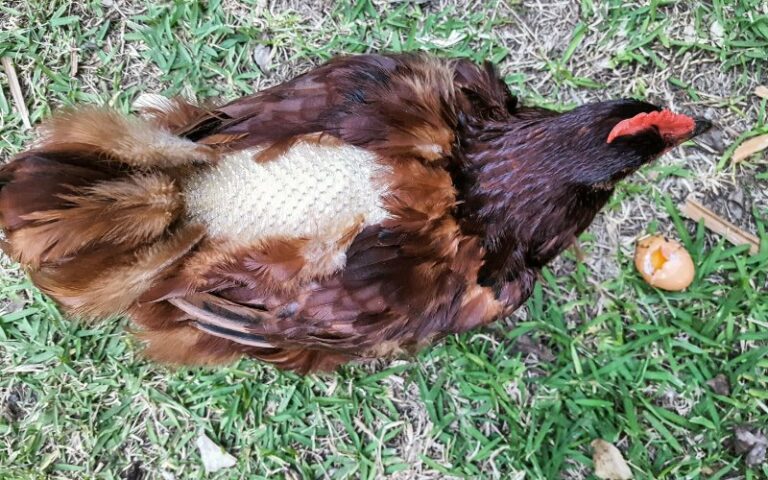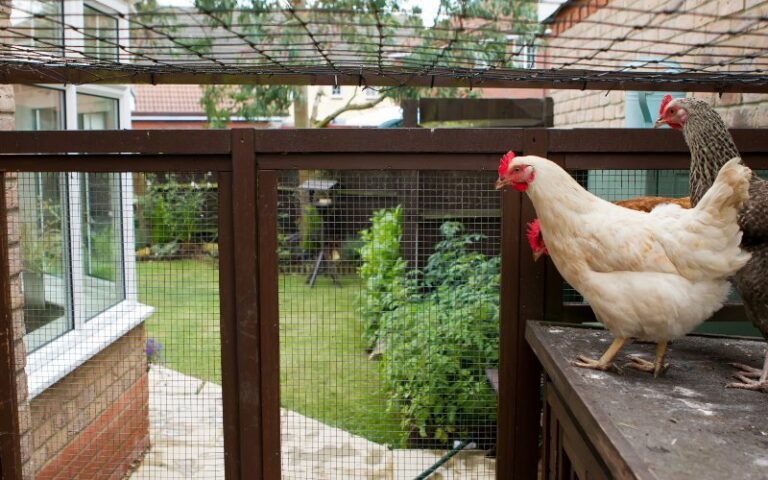How to Stop Chickens from Eating Eggs (6 Tactics to Try)
It seems like hens would naturally protect their eggs and their young, and that eating their own eggs would be the last thing they’d want to do. While, depending on breed, many chickens are quite protective of their chicks and the eggs they’re trying to hatch, hens will sometimes eat their own eggs.
Egg-eating is counterproductive for poultry owners who raise chickens for eggs. However, it also points to a real issue. Healthy and happy hens won’t eat their own eggs, so if you’ve noticed this happening often, try to find out the reason and resolve it before chickens start habitually turning to their own eggs as a food source.
Unfortunately, chickens eating their own eggs is a more common problem than you’d expect – I’ve had to deal with it numerous times. On the bright side, however, I’ve discovered a number of strategies that work quite well to fix this problem.
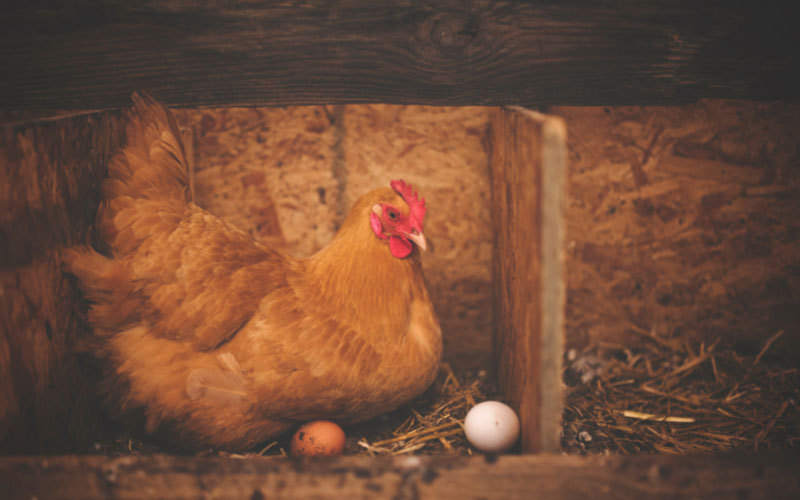
How to Stop Chickens From Eating Eggs (The Short Answer)
Chickens typically eat their own eggs because of boredom, a lack of nutrition, egg breakage, or the bad example of other egg-eaters. To stop chickens from eating eggs, make sure that they’re getting the protein and calcium they need, they have plenty of entertainment, they don’t have access to broken eggs, and they can’t learn egg-eating habits from other chickens.
Why Do Chickens Eat Their Eggs?
Chickens may eat their eggs for a number of different reasons. Here are some of the most common:
- Lack of nutrition: If your hens aren’t getting the protein or calcium they need in their feed or supplements, they may turn to eating eggs as a way to get important nutrition. Producing eggs uses up a lot of a chicken’s protein and calcium supply – and, as a result, eggs are a great source of protein and calcium for chickens that aren’t getting enough. A lack of calcium is usually the problem for my flock.
- Boredom: Chickens may start eating eggs if they don’t have sufficient space to peck around in. Boredom can actually cause egg-eating.
- Egg breakage: Sometimes chickens won’t eat intact eggs, but if they find a broken egg they’ll taste it and may decide that they like it. This situation can quickly spiral into a bigger problem. Whether egg breakage is caused by weak shells, hard nest boxes, or accidents when you’re gathering the eggs, it can cause egg-eating among your chickens.
- Bad example: Chickens often lead each other astray. If one hen develops a habit of eating eggs, it’s likely that the other hens in the flock will pick up on that and start doing it as well. That’s why it’s incredibly important to stop an egg-eating habit immediately.
Chickens Eating Eggs – Try These 6 Things to Put a Stop to It
Whether you’ve noticed just one broken egg that looks like it’s been pecked or egg-eating has been an ongoing problem among your flock, here are some of my favorite strategies for how to keep chickens from eating eggs.
Check Nutrition Levels
Research what percent of protein your chicken feed has. It should be at least 16 percent protein. If your chickens aren’t getting enough protein, try a different feed or supplement with protein-heavy kitchen scraps like yogurt and seeds. Pay attention to every member of your flock; bullied chickens often don’t get enough feed and turn to egg-eating as a source of vital protein.
Make sure that your hens are getting enough calcium as well, as it’s necessary for healthy layers to produce high quantities of healthy eggs. Oyster shells, especially, help them lay strong eggs, removing the temptation to use eggs as a source of calcium and creating stronger eggs that are less likely to break.
Some chicken owners feed eggshells to their chickens as a source of calcium. While eggshells do contain a lot of calcium that chickens can recycle, it could also be a mistake to train hens to eat their own eggshells. Some poultry owners crush and dehydrate the eggshells so that chickens don’t associate them with the shells of their freshly-laid eggs. However, you may want to simply purchase an oyster shell grit from your local feed supply store.
Avoid Egg Breakage
Broken eggs can quickly become a problem as curious chickens won’t hesitate to give the mess a taste. This could lead to egg-eating habits among your whole flock. Egg breakage is typically caused by three problems:
- A lack of soft bedding in nest boxes. If you don’t have a nice soft cushion for hens to lay their eggs on, you’re more likely to end up with broken eggs.
- Not enough calcium. If calcium intake isn’t high enough, chickens simply won’t have the resources necessary to lay eggs with strong shells. These eggs will break incredibly easily.
- Human carelessness. It’s pretty obvious; if you drop an egg, it will break. Young kids love to help with gathering eggs, but they’re more liable to break them, causing a puddle of raw egg in your chicken coop.
Egg breakage is sometimes unavoidable, even if you’re the most careful of chicken owners. One broken egg won’t make your whole flock start eating eggs – as long as you’re careful to clean it up. I always clean up broken eggs right away, before my chickens have a chance to try raw egg.
Remove the Temptation to Eat Eggs
Sometimes boredom causes chickens to eat eggs. Try creating or purchasing slanted nest boxes that roll eggs out of sight as soon as they’re laid. This will remove the temptation to eat eggs before your hens have a chance. Slanted nesting boxes are a great solution if you have chickens that are already in the habit of eating their eggs; they literally make it impossible for chickens to keep destroying their eggs.
If you don’t want to invest time or money in slanted nest boxes, try collecting eggs frequently so that they’re not sitting in the coop all day waiting for chickens to give them a taste. Collecting eggs two to three times a day is a good idea. Keep in mind that hens usually lay in the morning and finish by around 10 a.m.
It’s a good idea to make sure that chickens have plenty of room to keep themselves entertained. Chickens eating eggs can be a sign that they’re bored, so I try to give egg-eating chickens extra room to run around and play. You can also add branches, bedding, hanging treats, and other interesting items to their coop to change their environment a little.
Use Fake Eggs as Deterrent
These strategies might give your chickens a bad association with egg-eating. Try putting a wooden egg, golf ball, or some other sort of fake egg in your chickens’ nest boxes. When they try to eat these “eggs”, they won’t get what they’re looking for and it might help break the habit of egg-eating.
Chickens really hate the taste of mustard and dish soap, so you can also try filling an empty eggshell with these ingredients and putting it in their nest box. If your chickens try to eat this egg, they’ll get an unpleasant surprise that may make them decide egg eating isn’t worth it.
Isolate or Get Rid of Problem Chickens
If it’s obvious which hen is eating eggs, and if you can’t solve the problem quickly, I suggest removing the egg eater as soon as possible. Chickens who start eating eggs won’t just eat their own eggs, so they can start causing a major decrease in the eggs you’ll get to collect each day. Egg eaters may also be a bad example to other chickens; once one hen starts breaking and eating eggs, the other hens have access to broken eggs and may follow her example.
Broody hens may cause crowded nesting boxes, and, as a result, chickens may lay anywhere in their coop. This can cause higher egg breakage rates and egg-eating problems. If you can, try to remove broody hens temporarily or provide extra nesting boxes and bedding to eliminate these problems at their root.
Avoid Bright Lighting and Other Disturbances
Sometimes various disturbances while laying can cause abnormal habits like egg eating in chickens. If any sources of light, like heater lamps, are in or nearby to your coop, make sure that they aren’t near the nest boxes. Consider creating nest box curtains to keep your chickens’ laying environment cool and dark. Darkness also makes it more difficult for hens to see their eggs, making egg-eating less of a temptation.

